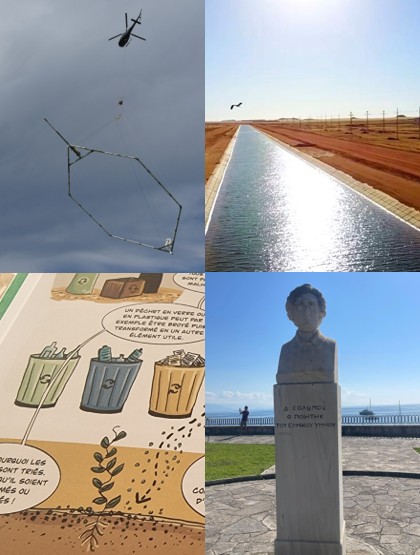The Mediterranean is being told this week from contrasting angles. In Corfu, overtourism is prompting a rediscovery of literary backroads. In Tunisia, artists and authors are mobilizing culture to defend the environment. In Egypt, the Grand Ethiopian Renaissance Dam is reviving tensions over the sharing of the Nile. In France, the BRGM is exploring the mountains to better understand underground water resources.
Summary of articles published this week in 22-med, available in the 11 languages used on the site. To read them in full: subscribe and support an independent media.
Mediterranean Chronicles: Corfu, Backroads
The reality of Corfu today is that it is an island overwhelmed, if not invaded, by overtourism in the Mediterranean. It is difficult to find a place as a wanderer, or better yet, as a traveler seeking the unexpected, a certain taste of elsewhere, and the pleasure of being amazed, if not surprised. There remains the possibility of taking backroads, starting with those of literature and writers.
Culture at the Heart of Ecological Awareness
In the face of plastic pollution, desertification, and the absence of a true national environmental education strategy, Tunisian artists are committing to raising awareness. Like the author and illustrator Nada Dagdoug, who signs Yeza, a comic where youth confronts the ecological crisis with clarity and hope. Others, such as the Envirofest festival, use cinema as a tool for alert and mobilization.
The Renaissance Dam Revives the Debate on Nile Sharing
As the filling of the Grand Ethiopian Renaissance Dam (GERD) continues in Ethiopia, researchers and farmers are concerned about its consequences on Egypt's water and agricultural security. An American study mentions the loss of a third of cultivated land each year in case of drought. Egyptian experts denounce exaggerated estimates while reaffirming the necessity of a fair agreement on the sharing of Nile waters.
A New Technology to Detect Water Buried Under the Mountains
For several weeks now, a slowly and regularly moving helicopter, carrying a large circular antenna beneath it, has been flying over the Pyrenean reliefs (southwest of France). The operation, which catches the attention of the locals, is not a military exercise, but a long-term scientific mission. Indeed, the Bureau de Recherches Géologiques et Minières (BRGM) is mapping the deep layers of the subsoil in 3D to locate potential reserves of fresh water. A first in the mountains, set to expand throughout France and, perhaps tomorrow, around the Mediterranean basin.
